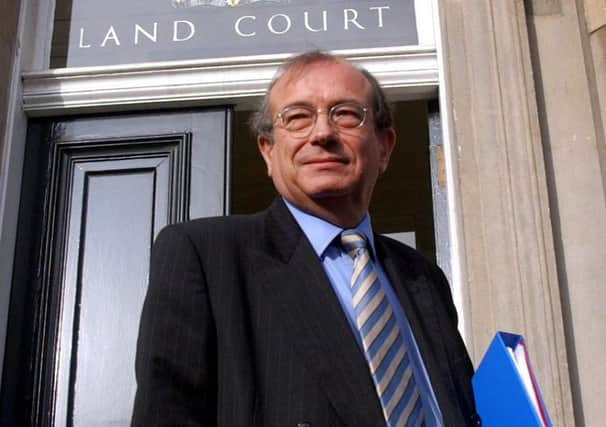Tom Peterkin: Lord Sewel's intervention won't quell SNP outrage


By and large Lord Sewel has endeavoured to keep a low profile ever since he was filmed apparently snorting cocaine in the company of naked prostitutes.
Who can blame him? The newspaper exposé of the Labour peer’s colourful bedroom habits in 2015 somewhat confounded the old adage that all publicity is good publicity.
Advertisement
Hide AdAdvertisement
Hide AdIn such circumstances it is perhaps unsurprising that Lord Sewel has been of the view that a spell away from the public eye might be in the best interests of everyone.
Therefore it must have been a particularly pressing issue to lure Lord Sewel back into mainstream politics.
This week Lord Sewel felt sufficiently strongly about the political convention drawn up in his name, to give his views on the Scottish Government’s dispute with the UK government over the distribution of EU powers post Brexit.
Rows centred on the finer points of the Sewel Convention lack the excitement and sheer entertainment value of a good fashioned sex and drugs scandal. But at the moment it is about the best that the Scottish political scene can come up with when it comes to political fun and games.
Before he became better known for his personal pecadilloes, Lord Sewel was one of the architects of devolution and was responsible for drawing up the convention that Westminster should “not normally” legislate in devolved areas.
This convention has been at the nub of the SNP complaints that Westminster has “ripped up” the devolution settlement by going ahead with the EU Withdrawal Bill when Holyrood has failed to give it consent.
Helpfully for the UK government, Lord Sewel took a different view when he was collared on the issued by the BBC earlier this week. He said the “size and scale” of Brexit meant the UK government was justified in legislating without the support of MSPs.
He argued that the “not normally” phrase in his convention recognised the possibility that “something quite out of the ordinary would happen, which would mean the UK parliament would be required to legislate in a devolved matter even without the permission of the Scottish Parliament”.
Advertisement
Hide AdAdvertisement
Hide AdHe added: “I think we’re all pretty well agreed that Brexit and leaving the EU is a major constitutional adjustment. We don’t live in normal times, in other words.”
The UK government may have reason to welcome Lord Sewel’s re-emergence from obscurity as well as his declaration that the UK is not in the throws of a constitutional crisis. But it goes without saying that his intervention will do nothing to deter SNP politicians from milking as much political capital as they can what they have labelled a Brexit “power grab”.
One of the challenges that the SNP faces is managing to persuade voters that their cause justifies the stormy rhetoric and grand gestures, typified by the SNP’s Westminster walk-out last week.
On the face of it there is a sound common sense argument for what the UK government is trying to do – freeze some returning EU powers in 24 devolved areas for a limited number of years so that UK frameworks can be drawn up to protect the UK internal market. Even the SNP has conceeded that it makes sense for UK frameworks to ensure a level playing field when it comes to items such as food labelling and animal welfare regulations north and south of the Border.
Despite the vast majority of powers repatriated from the EU in devolved areas going to Holyrood, the SNP is objecting to Westminster’s temporary retention of powers in the 24 devolved areas.
To many it seems a strangely nebulous difference of opinion for a political party to go to the barricades on.
But the row escalated dramatically when the Scottish Parliament voted against giving consent to the UK government’s EU Withdrawal Bill on the grounds that it disrespected devolution. That vote saw the SNP, Labour, Lib Dems and Greens reject the legislation by 93 votes against the 30 votes cast by the Tories. That catapulted the row into new territory, pitting Holyrood against Westminster – raising questions of parliamentary sovereignty, which the SNP are desperate to exploit.
Unfortunately things have already begun to turn ugly. The SNP Westminster leader Ian Blackford was so outraged by the treatment of devolution that he meted out some pretty rough treatment to Scottish Secretary David Mundell. In a Westminster debate on devolution on Monday, Mr Blackford resorted to a personal attack on the Scottish Secretary describing him as “yellow”, “a dismal failure” and a “disgrace” for not fighting Scotland’s corner.
Advertisement
Hide AdAdvertisement
Hide AdMeanwhile at Holyrood, the scene is being set for more argy-bargy. Scotland’s Brexit minister Michael Russell spent Tuesday afternoon suggesting that Lord Sewel’s convention should be embedded in law – a demand that will be knocked back by the UK government because it would amount to Holyrood getting a veto over Westminster legislation.
With both sides digging in, the arguments are only likely to become louder. With the SNP enjoying a membership surge of more than 5,000 since last week’s Westminster walk-out, Nicola Sturgeon’s hope must be that more are converted to her cause. Whether the powers issue at stake is compelling enough to change widespread public opinion remains to be seen. What is more certain is that none of this bodes well for those hoping politicians can set aside their differences and make the most of the hand dealt by Brexit.